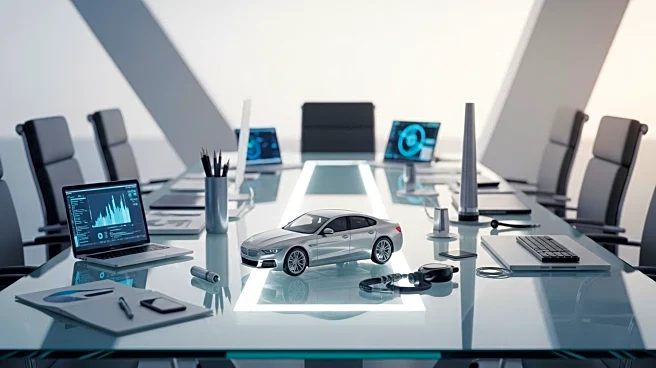What's Happening?
Ford Motor Company is relocating its world headquarters for the first time in seven decades to a new campus three miles away in Dearborn, Michigan. The new headquarters will be situated on the site of the former Product Development Center and will feature six design studios, a food hall, wellness rooms, and tech-enabled meeting rooms. The move aims to enhance collaboration and innovation by co-locating corporate leadership with design and engineering teams. The Glass House, Ford's current headquarters, will be demolished to create outdoor community space. The relocation is part of a broader industry transformation towards electrification, autonomy, and digital services.
Why It's Important?
The relocation of Ford's headquarters signifies a strategic shift towards integrating corporate leadership with design and engineering teams, fostering innovation in the automotive industry. This move aligns with the industry's transformation towards electrification and digital services, potentially enhancing Ford's competitive edge. The demolition of the Glass House to create community space reflects Ford's commitment to sustainability and community engagement. This decision may influence other automotive companies to reconsider their operational structures to boost collaboration and innovation.
What's Next?
Ford's relocation is expected to facilitate closer collaboration between executives and engineers, potentially accelerating the development of new automotive technologies. The new campus will likely become a hub for innovation, attracting talent and fostering partnerships. As Ford transitions to its new headquarters, stakeholders will be watching for advancements in vehicle design and technology. The industry may see similar moves from other companies seeking to enhance collaboration and innovation.
Beyond the Headlines
The relocation of Ford's headquarters could have long-term implications for the automotive industry, including shifts in corporate culture and operational strategies. By prioritizing collaboration and innovation, Ford may set a precedent for other companies to follow, potentially leading to a more integrated approach to vehicle development. The creation of community space from the Glass House demolition highlights Ford's commitment to sustainability and community engagement, which could influence corporate social responsibility practices across the industry.










